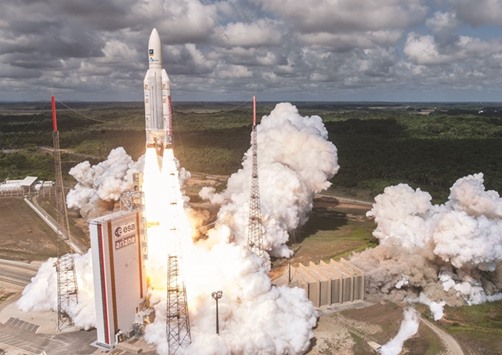After 17 years, numerous setbacks and three times over budget, Europe’s Galileo satellite navigation (satnav) system went live yesterday, promising to outperform rivals and guarantee regional self-reliance.
Initial services, free to users worldwide, are available only on smartphones and navigation units fitted with Galileo-compatible microchips.
Some devices may need only a software update to start using the service, according to the European Commission, which funds the €10bn ($11bn) project.
“After years of intense work, we are ready to declare the initial services of Galileo,” EU Industry Commissioner Elzbieta Bienkowska announced in Brussels. “We are joining the closed club of providers of navigation services.”
With 18 satellites in place so far, Galileo’s signal will be intermittent at first, requiring a boost from satellites in the American GPS system.
But it will grow more reliable and independent over time as orbiters are added to the network circling 23,222km (14,430 miles) above Earth.
Its proud parents, the commission and European Space Agency (ESA), said Galileo should be fully operational by 2020, providing time and positioning data of unprecedented accuracy.
People have become increasingly reliant on geo-localisation for anything from finding bars, pharmacies or the shortest holiday route to tracing parked cars or lost Alzheimer’s patients.
Ultimately, Galileo’s free Open Service will be able to pinpoint a location to within 1m, compared to several metres for GPS and Russia’s GLONASS.
A paying service will provide even more precise data, to within centimetres.
Such precision would be invaluable for safer driverless cars and nuclear power plants, for example.
“When fully operational, Galileo’s Search and Rescue service will reduce the time it takes to detect a person lost at sea or in the mountains from three hours to just 10 minutes after a distress beacon is activated,” the Galileo website says.
Its signal will eventually reach areas where none is possible today – inside traffic tunnels and on streets where high buildings shield radio waves from satellites flying low on the horizon.
For now, free use is only for owners of two Galileo-compatible cellphones (BQ’s Aquaris X5 Plus and Huawei’s Mate 9), and about a dozen types of Galileo-ready chips produced by Qualcomm, Broadcom, Intel, Mediatek and u-blox.
A list of Galileo-enabled products can be consulted at www.useGalileo.eu
“We need the businesses to invest in and innovate with Galileo. To create new applications, new services,” said Bienkowska.
The civilian-controlled service is of great strategic importance for Europe, which relies on two military-run services – GPS and GLONASS, which provide no guarantee of uninterrupted service.
Named after Italian astronomer Galileo Galilei, the project was first approved with an initial budget of around three billion euros and plans to be operational by 2008.
It suffered several technical and budgetary setbacks, including the launch of two satellites into the wrong orbit in 2014.
Its total cost until 2020 is now calculated at about €10bn.
The European Commission expects the project will ultimately be an important commercial venture, adding some €90bn to the EU economy in its first 20 years.
Almost 10% of Europe’s gross domestic product is thought to depend on satellite navigation today – a figure projected to grow to about 30% by 2030.
The system’s groundbreaking accuracy is the result of the best atomic clocks ever flown for navigation – accurate to one second in 3mn years.
Galileo will also have stronger signals carrying more information, its makers say.

This file photo taken on November 17 released by the European Space Agency (ESA), the Centre Bational d’Etudes Spatiale (CNES, the French government space agency) and the Arianespace satellite launch company shows the Ariane 5 rocket with a payload of four Galileo satellites lifting off from ESA’s European Spaceport in Kourou, French Guiana. Seventeen years and more than u20ac10bn ($11bn) later, Europe’s Galileo satnav system went live yesterday.
